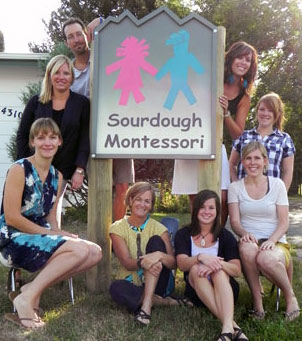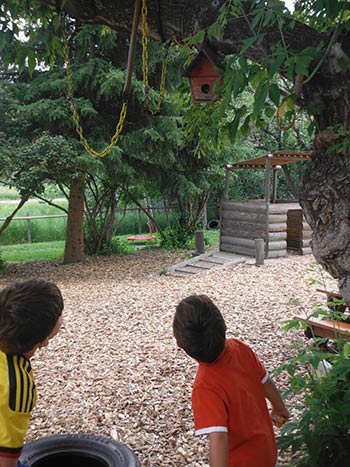What is Montessori?
American Montessori Society
The Montessori Method
as it pertains to the three to six year old child
 The basic idea in the Montessori philosophy of education is that every child carries unseen within themselves the man or woman they will become. In order to develop their physical, intellectual and spiritual powers to the fullest, the child must have freedom - a freedom to be achieved through order and self-discipline.
The basic idea in the Montessori philosophy of education is that every child carries unseen within themselves the man or woman they will become. In order to develop their physical, intellectual and spiritual powers to the fullest, the child must have freedom - a freedom to be achieved through order and self-discipline.
The world of the child is full of sights and sounds which at first appear chaotic. From this chaos, the child must gradually create order, and learn to distinguish among the impressions that assail his or her senses, slowly but surely gaining mastery of themselves and their environment.
Dr. Maria Montessori developed what she called the "prepared environment" which already possesses a certain order and disposes the child to develop at his own speed, according to his own capacities, in a non-competitive atmosphere. "Never let a child risk failure until he has a reasonable chance of success," said Dr. Montessori, understanding the necessity for the acquisition of a basic skill before its use in a competitive learning situation. The years between three and six are the years that a child most easily learns the ground rules of human behavior. These years can be constructively devoted to "civilizing" the child - freeing him or her through the acquisition of good manners and habits that will allow them to freely take their place in their culture.
 Dr. Montessori recognized that the only valid impulse to learning is the self-motivation of the child. Children move themselves toward learning. The teacher prepares the environment, programs the activity, functions as the reference person and exemplar and otherwise offers the child stimulations. But it is the child who learns, who is motivated through the work itself (not solely by the teacher's personality) to persist in his chosen task. Accordingly, children in a Montessori environment are given great discretion in choosing the work they do and the manner in which they do it.
Dr. Montessori recognized that the only valid impulse to learning is the self-motivation of the child. Children move themselves toward learning. The teacher prepares the environment, programs the activity, functions as the reference person and exemplar and otherwise offers the child stimulations. But it is the child who learns, who is motivated through the work itself (not solely by the teacher's personality) to persist in his chosen task. Accordingly, children in a Montessori environment are given great discretion in choosing the work they do and the manner in which they do it.
This then is a fundamental part of the Montessori environment: giving the child the “space” to learn at their own pace. The Montessori teacher recognizes that each child is different not only in what they are motivated to learn about, but in their level of ability. The task then for the Montessori teacher is to structure an environment which not only allows for individual direction by the students but encourages it.
All of this freedom in the hands of little ones might otherwise be a terrifying concept were it not for another important part of the Montessori environment: the manner in which children are taught the importance of appropriate social behavior with others, and appropriate care for the things in their environment. Respect for all people and living things as well as objects form an important part of the child’s ability to learn their place in the world and are an important part of the Montessori experience.
Children in the Montessori environment acquire the personal skills and work habits necessary for success in learning. For example, while an otherwise slow learner in a “normal school” might take little from their classroom experience except a sense of inferiority over their “slowness” in mastering a given subject or task, the Montessori student would, (if given the chance to work at their own pace, in their own way), develop a sense of stick-to-itiveness for having accomplished a difficult challenge. In the process they would grow to understand the effort and concentration necessary to accomplish a goal. And when they finally did master something which had been a real struggle, they would see why the feeling of self-satisfaction is so far superior to any praise from a teacher.
 The method by which children are taught in the Montessori school might well be called "programmed learning" in the way so many of the materials with which the child works provide a form of self-correction of errors and make apparent to both teacher and child the child’s relative level of performance.
The method by which children are taught in the Montessori school might well be called "programmed learning" in the way so many of the materials with which the child works provide a form of self-correction of errors and make apparent to both teacher and child the child’s relative level of performance.
The American Montessori Society has emphasized the importance of Montessori insights as they apply to the education of not just children but adults of all ages. Although children traditionally begin Montessori education at age three, the principles of self-motivated learning apply to all learning experiences. Modern learning research has confirmed the validity of the Montessori principles of programmed learning and the non invasive teacher (who allows for the learning experience to occur without intrusion from the teacher). Many public, private, and parochial elementary and secondary schools are now utilizing this approach.






